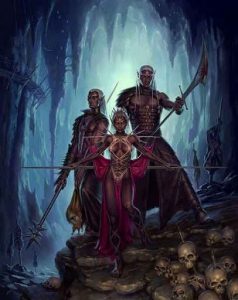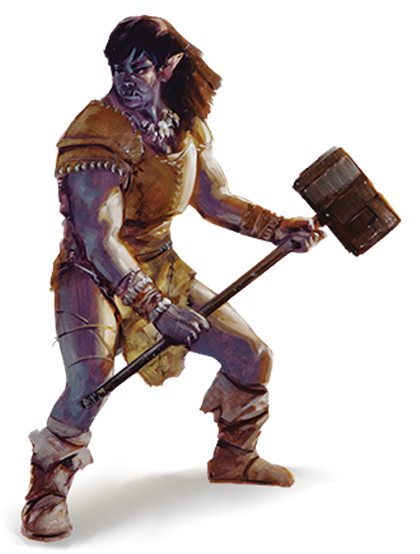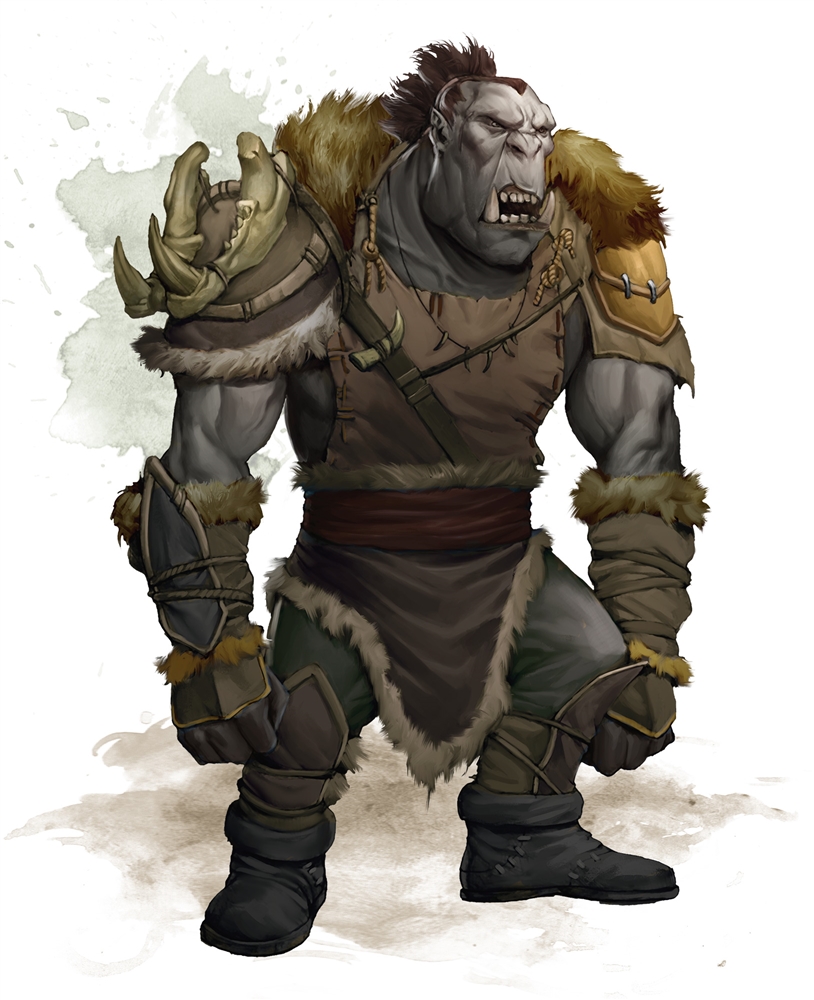From Katya: Wizards of the Coast recently announced (by recently I mean mid-June. It’s been a YEAR y’all) ways that they’re attempting to address the game’s racist characterizations of, well, in-game races. In their announcement, they acknowledge the widespread critique of their rules surrounding races, particularly the ways that stereo-typically dark-skinned fantasy races — specifically orcs and drow (dark elves, for non dnd folks) — are presented as inherently “monstrous and evil.” Their proposed improvements include making the worlds of orc and drow more complex culturally and morally, changing racially insensitive text, greater flexibility in character stat customization, and seeking to hire a more diverse staff.
Hopefully Wizards of the Coast follows through on this, particularly hiring a more diverse staff. While gamers are very diverse (statistics indicate, for example, that there are equal numbers of male and female gamers) this is often not reflected in the industry or many gaming spaces where diverse gamers aren’t often represented or, often, do not even feel welcome.
Wizards of the Coast aside, I’m not convinced that race-based character classification systems in general can be fixed. In broad terms, these systems assign personality traits, skills, and innate characteristics based on a character’s race. Specifically the 5th Edition Player Handbook notes that races shape character skills by “increas[ing] one or more of a character’s ability score and their alignment (good, evil, neutral etc.)
Some aspects are determinant (such as the character’s speed) others (like alignment) are tendencies rather than cut-and-dry rules. For example, my main dnd character is a chaotic neutral half-elf/ half-human rogue thief. Many of her abilities are based on her past and her profession, like being stealthy AF and able to climb walls in a single bound because treasure dammit. As a half-elf, however, she has an automatic ability increase (+2) to charisma, a +1 bonus to two other skills of the player’s choice, and are likely to be chaotic. They also have “skill versatility” giving them proficiency in two skills of the player’s choice. Looking just at the half-elf entry you might get the impression that being, as 5e calls it “between two worlds” in the half-elf section makes effectively bi-racial characters adaptable and more able to determine their own path. Not so, however.
A half-orc, on the other hand, has an automatic +2 to strength and +1 to constitution. They are also chaotically inclined: “inherit[ing] a tendency toward chaos from their orc parents and are not strongly inclined towards good.” The handbook notes that when raised among other orcs in what it calls “Tribes and Slums” as they typically are (presumably due to prejudices against orcs in general), they are usually evil. Half-orcs are also automatically “Menacing” granting proficiency in intimidation and have “Savage Attack” which, while a cool ability, plays into the racial stereotypes already in play.
Half-orcs lack the mobility and versatility of their half-elf counterparts. For the half-elf, having diverse ancestry is a benefit allowing them to be natural ambassadors and choose their own destiny. For the half-orc, it makes them uncontrollable, full of rage and violence, and -because stats are fixed rather than player assigned- trapped within the racial norms of the orc narrative.
There is some play within these categories that allow you to play against type but this usually requires a flexible DM and a fair amount of fudging the margins. (Ask me about my barbarian gnome that has an axe bigger than she with a cartoon rabbit on the haft.) Playing against type in this way reinforced the notion that there is a type to begin with and it’s the accepted norm. These norms also can become a point of contention among players themselves. In the past, I’ve seen resistance both in and out of game when I or another player shows up to play as one of these off-type characters or proposes one to a DM. In these instances, player’s gameplay style seems more likely to be policed by others even when they have the stamp of approval from their DM. This often becomes part of the ‘real gamer’ narrative that excludes those who do not present as white, hetero-normative male players. Self proclaimed “expert” gamers sometimes attempt to shut down these against-type characters because they aren’t “playing DnD correctly” by adhering to the norms stated in the handbook. Individuals who attempt to represent themselves or a version of themselves that was not originally afforded by the original rules are then being again excluded from the community as well as the game because tinkering with the game to make to represent themselves and their values is rejected as incorrect play.
I have a few examples of this like @mustangsart’s release of their Combat Wheelchair on Twitter and the ensuing trash fire of toxic gamers wanting everyone to get our desires for equality, inclusion, and representation our of their game. But until the episode, what do you think of rewriting racial features and their presentation in 5e? Do you think the system could be fixed or is it even worth fixing? What representations of different identities in games have spoken to you? Or been alienating experiences?









Huh. Didn’t see this one coming.
I’m currently involved in a D & D campaign being played weekly and virtually. My character is a Drow, and it was permitted by the Dungeon Master. I won’t go into specifics, but my character is abnormal for his race and would probably be shunned by traditionalists.
That said, what is D & D but collective storytelling? It’s a narrative that’s set forth by one individual and guided by a group. If someone chooses to play a race a certain way and everyone else agrees, why should anyone care? If I were born an actual Drow, I might be upset by the prejudice against me…but no one is born an actual Drow.
And that’s the rub for me. This seems to be creating controversy where there is none. I can’t speak for everyone, but I personally would prefer proactive efforts against racism in real life, as opposed to a fantasy world. I think that would be far more helpful on the whole.
While being a fantasy based game, D & D isn’t a sanitized world, for the most part. The darker aspects of “human” nature exist in this world – there’s still crime, hunger, social inequality, etc. These are often obstacles to be overcome. So why isn’t racism lumped into the big pile of vices?
The biggest issue is that the fantasy races and the struggles between them are meant to be symbolic of human race relations. It’s not by accident that Underdark races like Drow and Duergar have black skin. And if someone can look at a D&D race and see every member of that race as being inherently evil, how hard a leap is it to look at human races and think perhaps that person over there that looks different from me might be inherently evil based solely on his race as well.
Have you been to any gaming conventions? They are pretty much a sea of white. Do you realize how few PoC play D&D? The numbers are much lower than they should be given population percentages.
There are lots of reasons for this, but one of those reasons is that the representation of races in D&D makes PoC feel intentionally excluded. WotC does polling. WotC knows this. And it is one of the few reasons that WotC has full control of. That is why WotC is making changes. Yes, it is primarily a business decision, but it happens to be one that is ethically sound.
Now, to address the messier part of your statement.
Just because these are fictional races, that doesn’t mean their portrayal doesn’t represent real world racism. D&D is absolutely filled with bleed from the real world. Kara-Tur and Al-Kadim are some of the most obvious examples. These are cultures that are pretty much ripped directly from real life China and Middle East, respectively.
But even without those obvious examples, you can see bleed everywhere in D&D. And that means that you can’t simply separate the fantasy from the reality.
And maybe you haven’t noticed it, but PoC are aware that pretty much anyone who isn’t modeled off of medieval Europe tend to be labeled as evil or savage. The darker the skin of a race, the more likely that race is to be evil. Dark elves are just the most blatant example, but they aren’t the only one. I challenge you to look through the Monster Manual and find ANY race that is dark skinned and primarily good. Sure, most of the creatures in the MM are evil, but there are some good races and they are, almost to a number, light skinned.
And lets return to the depictions of cultures. I’ll use Forgotten Realms for examples. The “hero” cultures (Waterdeep and Cormyr) are unquestionably based off of European cultures. And while there are some European based evil cultures, pretty much any country based off of another area (Middle East, Africa, South America, China, Turkey, etc.) is depicted in a negative light (slavers, criminals, savages, etc.).
This has been true for over 40 years. Writing it off as “just fantasy” only perpetuates the problem.
Michael Strauss, I believe that your comments are in part directed towards me. At least, I was the individual who stepped into the “just fantasy” trap.
I can only speak to my own experience and perception. Our experiences aren’t shared, and we haven’t gamed together. I can’t say that what you’re saying isn’t valid, only that it hasn’t been my experience.
That said, I’ll bear your comments in mind as I move forward.
Maybe D&D is a season white because POC are subtly made to feel unwelcome at the table.
I actually believe there are plenty of POC D&D players out there just not inhabiting the typical white spaces like cons because it isn’t worth the struggle.
Brian Bennett, you’re probably right. It’s the issue of representation. While I guarantee that no one I’ve ever played with was made to feel uncomfortable, I don’t believe that I’ve ever played D & D with a person of color. It’s a weird dilemma, because you just invite your friends, and that’s often reflective of the inclusiveness or exclusiveness of your friend circle. I think it would be weird to say “Hey, we need a POC or someone non-binary in the group.”
Terry Lee I’m mainly speaking to the con scenario.
I once played a Dark Elf. He considered the word “Drow” to be a racial slur. I have never given up that opinion out of game.
It’s nice to see WotC making an effort, but they have a poor track record and I don’t think the stereotypes can ever truly be fixed.
Are you looking for guests? A couple friends of mine have presented about diversity in RPGs at Cons etc.
I’m actually currently running a game set in a theocracy dedicated to the main god of good (Dragonlance set in the final days of Istar for those that know the setting) and the overarching theme of the campaign is how “good” when taken to the extreme can lead to intolerance. The current arc has the party fighting goblinoids in a genocidal attempt to rid the planet of their kind because clearly they’re all “evil”. The hope is that the players pick up on the clues I’ve been dropping that the goblins are raiding human villages because they’re starving and they’ve been pushed into living in harsh and difficult environments by a society that persecutes them. Sadly the party summarily executed a starving giant last game with barely any discussion, so it’s not looking great for the future of the goblins just yet…
Bio-essentialism needs to go. However it will wreck so much lore. WotC has backed themselves into a corner. It needs to happen but will be rough.
I have a system for giving stat bonuses that are not racially connected but instead are vocational connected… this way you get rid of “suboptimal” races.